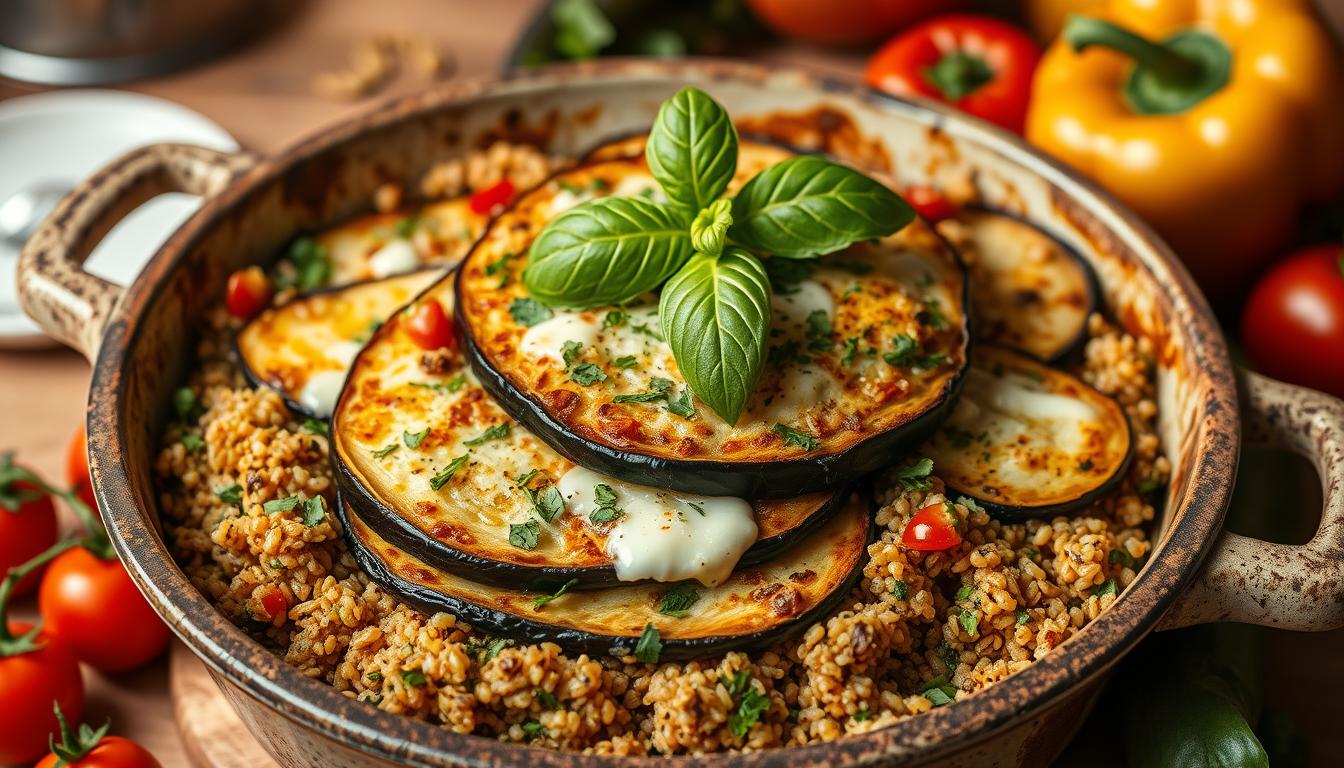Have you ever thought about how your diet affects fibromyalgia symptoms? This chronic pain condition affects over 3 million people in the U.S. each year. Adding anti-inflammatory foods like eggplant and quinoa to your meals can help a lot. Try this nutrient-rich recipe for a new way to manage your pain.
Asia produces most of the world’s eggplant, and Thomas Jefferson introduced it to the U.S. Eggplant is full of antioxidants and nutrients that fight inflammation. This is key in reducing fibromyalgia symptoms.
Understanding Fibromyalgia and Its Dietary Needs
Fibromyalgia is a chronic pain condition that affects 4 million adults in the U.S. It causes widespread pain, fatigue, and sleep issues. Research suggests it might be linked to a nervous system malfunction that boosts pain signals. Eating the right foods can help manage fibromyalgia symptoms.
Certain foods can make symptoms worse. But, a diet full of nutrients and anti-inflammatory foods can help. This can ease pain and improve overall health.
What is Fibromyalgia?
Fibromyalgia is a chronic condition that causes widespread pain and fatigue. It also leads to sleep problems, memory issues, and mood changes. The exact cause is not known, but it’s thought to involve a nervous system problem that makes pain worse.
How Diet Impacts Fibromyalgia Symptoms
Diet is key in managing fibromyalgia. Some foods can make symptoms worse, while others can help. Eating foods that fight inflammation can reduce pain and improve health for those with fibromyalgia.
The Benefits of an Anti-Inflammatory Diet
If you have fibromyalgia or chronic pain, an anti-inflammatory diet might help. This diet includes whole, unprocessed foods that lower body inflammation.
By cutting out foods that cause inflammation, like processed foods and saturated fats, you can feel better. Eating more fruits, vegetables, whole grains, lean proteins, and healthy fats supports your health.
Studies link high-energy diets to pain sensitivity. But, a diet full of plants and antioxidants can help with arthritis.
- Fruits and vegetables have anti-inflammatory properties that reduce inflammation.
- Whole grains, like brown rice and quinoa, are full of fiber and nutrients, helping to lower inflammation.
- Omega-3 fatty acids in fatty fish and nuts reduce body inflammation.
- Spices like turmeric and ginger have anti-inflammatory effects and can ease pain.
Adding more anti-inflammatory foods to your diet is a big step towards managing fibromyalgia or chronic pain. A balanced diet is a key to better health and pain relief.
Eggplant and Quinoa Bake: A Nutrient-Dense Dish
The eggplant and quinoa bake is great for those with fibromyalgia. Eggplant is low in calories and high in fiber and antioxidants. These help reduce inflammation. Quinoa is a complete protein that also has complex carbs, fiber, and minerals like magnesium and iron. Both are fibromyalgia-friendly foods that can improve pain management, energy, and overall health.
Why Eggplant and Quinoa are Ideal for Fibromyalgia
Eggplant and quinoa are very nutritious for fibromyalgia patients. Eggplant is a nightshade vegetable that’s low in calories but rich in fiber, vitamins, and antioxidants. These make it perfect for an anti-inflammatory diet to help manage symptoms.
Quinoa is a gluten-free ancient grain that’s a complete protein. It has complex carbs, fiber, and minerals like magnesium and iron. These nutrients are key for energy, muscle function, and overall health in fibromyalgia patients.
This eggplant and quinoa bake combines the best of both. It’s a delicious and fibromyalgia-friendly meal that can help ease symptoms and improve health.
Ingredients for the Eggplant and Quinoa Bake
The eggplant and quinoa bake is a tasty and fibromyalgia-friendly recipe. It’s packed with nutrients and anti-inflammatory ingredients. Let’s explore the main ingredients that make this eggplant and quinoa bake recipe perfect for fibromyalgia sufferers.
The key ingredients in this anti-inflammatory meal are:
- Eggplant: A nightshade vegetable that is low in calories, high in fiber, and rich in antioxidants.
- Quinoa: A gluten-free ancient grain that is a complete protein and provides complex carbs, fiber, and essential minerals.
- Olive oil: A healthy fat that can help reduce inflammation.
- Garlic and onion: Aromatic vegetables that contain anti-inflammatory compounds.
- Herbs and spices: Such as turmeric, which has powerful anti-inflammatory properties.
- Vegetable broth: Adds moisture and flavor without the use of pro-inflammatory ingredients.
These fibromyalgia-friendly ingredients come together to create a nutritious and delicious eggplant and quinoa bake recipe. It’s a great addition to the diet of those with fibromyalgia.
Step-by-Step Instructions for Preparing the Dish
Making a tasty eggplant and quinoa bake is simple. Just follow a few easy steps to make a meal full of nutrients. Here’s how to do it:
Preparing the Eggplant
Cut the eggplant into 1-inch cubes. Mix the cubes with olive oil, garlic, onion, and seasonings. Roast in the oven at 400°F for 20-25 minutes until tender.
Cooking the Quinoa
Rinse the quinoa to remove bitterness. Cook it in vegetable broth as the package says. Fluff it with a fork to keep it light.
Assembling the Bake
Layer roasted eggplant and cooked quinoa in a dish. Add cheese, herbs, or breadcrumbs on top. Bake at 375°F for 20-25 minutes until hot and lightly browned.
And that’s it! You now have a tasty eggplant and quinoa bake recipe for meal prep and fibromyalgia-friendly cooking. Enjoy this nutritious dish as part of your fibromyalgia management plan.
Tips for Customizing the Recipe
The eggplant and quinoa bake is a versatile dish. It can be customized to fit your taste and dietary needs. You can change the flavors or meet specific dietary restrictions. This makes the recipe fibromyalgia-friendly and yours to enjoy.
- Swap in different vegetables like zucchini, bell peppers, or mushrooms for added variety and nutrient density.
- Experiment with a variety of herbs and spices to adjust the flavor profile, such as basil, oregano, or cumin.
- Boost the protein content by adding in ingredients like chickpeas, tofu, or lean animal protein.
- Top the bake with a sprinkle of healthy cheese like feta or mozzarella for a creamy, satisfying finish.
- Serve the eggplant and quinoa bake over a bed of leafy greens for an extra nutrient-rich meal.
- Freeze individual portions for easy meal prep and to have on hand for those days when chronic pain management is a priority.
This recipe can be tailored to your unique dietary needs and preferences. By using fresh, whole-food ingredients, you can make a dish that nourishes your body and pleases your taste buds.
The Role of Plant-Based Recipes in Fibromyalgia Management
Adding plant-based, nutrient-dense recipes like the eggplant and quinoa bake can help those with fibromyalgia. A diet full of whole foods, fruits, vegetables, whole grains, and healthy fats can lower inflammation. It can also ease pain, fatigue, and support overall health.
Plant-based recipes use anti-inflammatory ingredients that are good for fibromyalgia. They are a key part of managing this chronic condition.
Beans, lentils, and peas are packed with protein, iron, folate, and more. They are great for a fibromyalgia diet because they give energy and help fight inflammation.
Recipes with tofu, tempeh, hemp seeds, and seaweed are also good. They help with common diet issues like zinc, calcium, and iodine. By trying different anti-inflammatory eating options, you can make a balanced meal plan.
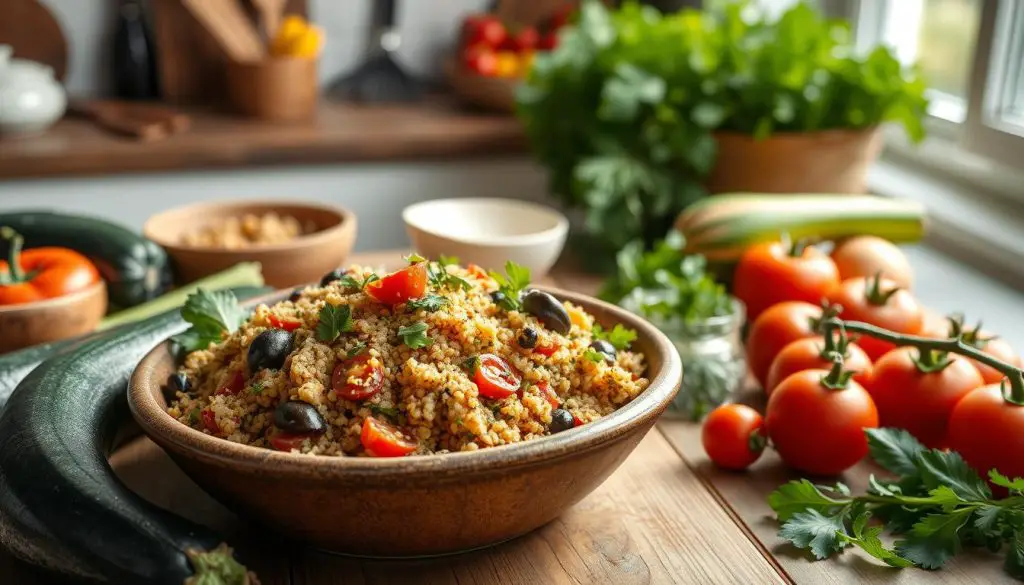
The secret to managing fibromyalgia with plant-based recipes is to use lots of whole foods. These foods help reduce inflammation and boost nutrients. By choosing wisely and trying new dishes, you can help manage your condition and improve your life.
Eggplant and Quinoa Bake for Fibromyalgia
If you live with fibromyalgia’s chronic pain and fatigue, this eggplant and quinoa bake could change your life. It’s packed with nutrients and fights inflammation. It’s made to help ease your fibromyalgia symptoms naturally.
Fibromyalgia is tough to handle, but adding more plant-based meals can help. The eggplant and quinoa bake is a tasty, healthy choice. It supports your health and well-being.
Eggplant and quinoa are great for fibromyalgia. Eggplant might help some people, even though it’s a nightshade. Quinoa is full of protein, fiber, and vitamins. It’s good for you.
Enjoying this eggplant and quinoa bake can help your body. It might ease some of fibromyalgia’s tough symptoms. Eating anti-inflammatory foods is key to managing fibromyalgia. Try to eat more dishes like this one.
Finding the right diet for fibromyalgia is important. Try different recipes and listen to your body. Make sure you’re eating foods that help your body thrive.
Incorporating More Nutrient-Dense Dishes into Your Diet
There’s more to a healthy diet than just eggplant and quinoa bake. Many other recipes are packed with nutrients and can help with fibromyalgia symptoms. These dishes offer vitamins, minerals, and help manage chronic pain.
Other Fibromyalgia-Friendly Recipes
Here are some tasty additions to your meals:
- Pumpkin seed granola mix: A crunchy, anti-inflammatory snack made with oats, nuts, and seeds that can help support your fibromyalgia diet.
- Kale chips: A satisfying, nutrient-dense alternative to traditional potato chips, providing a boost of essential nutrients.
- Hot quinoa cereal: A hearty, magnesium-rich breakfast option that can help support your energy levels and manage chronic pain.
These recipes are not just tasty; they’re also packed with nutrients. They offer the vitamins, minerals, and anti-inflammatory properties your body needs. By adding these dishes to your diet, you can better manage your chronic pain and improve your health.
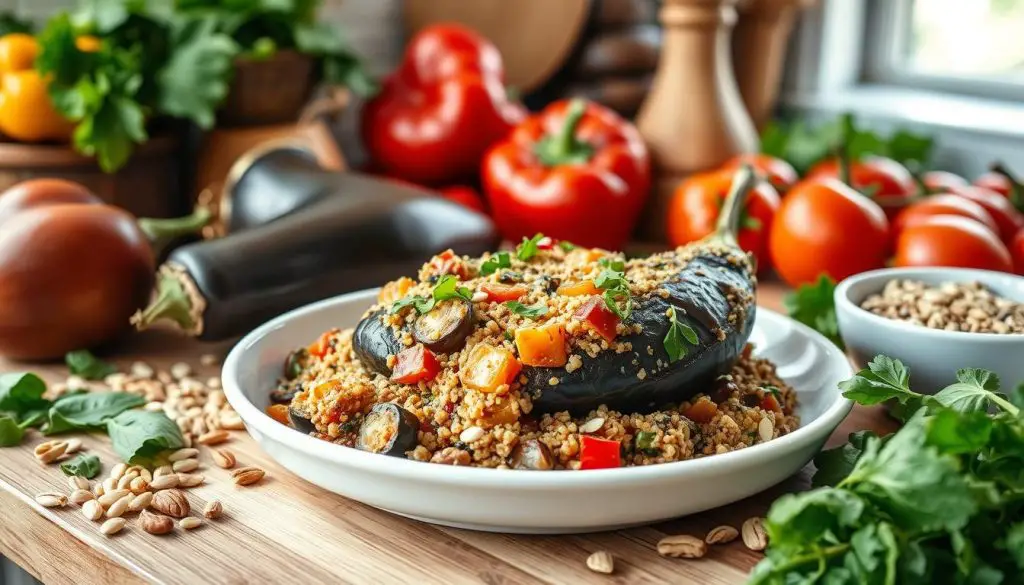
A balanced, nutrient-dense diet is key to managing fibromyalgia. By choosing wholesome, anti-inflammatory foods, you can nourish your body. This can help reduce the symptoms of this chronic condition.
The Importance of Meal Prep for Chronic Pain Relief
For those with chronic pain like fibromyalgia, meal prep is key. It helps you eat healthy, anti-inflammatory foods even when you’re tired or in pain. This way, you always have good food ready, making it easier to manage your symptoms.
Studies show that chronic pain affects 20-30% of people in Western countries. Many turn to drugs for relief, leading to addiction. But, an anti-inflammatory diet, like the eggplant and quinoa bake, offers a safer, natural way to manage pain.
Preparing meals like the eggplant and quinoa bake helps you stick to a healthy diet. It lets you rest and care for your body, without worrying about cooking. This way, you can focus on healing.
Meal prep also gives you a sense of control and routine. This is very helpful for those with chronic pain and fibromyalgia. By planning and preparing meals ahead, you’re actively improving your health and wellbeing.
If you have chronic pain, try meal prep as part of your fibromyalgia management. It’s a simple yet effective way to nourish your body and reduce inflammation.
Nightshade-Free Cuisine: An Alternative Approach
If you have fibromyalgia, a nightshade-free diet might help. Nightshades like tomatoes and peppers can cause inflammation. By avoiding these, you might feel less pain and stiffness.
The eggplant and quinoa bake in this article is a tasty nightshade-free option. It’s part of a broader approach to managing fibromyalgia through anti-inflammatory eating.
Understanding Nightshade Sensitivity
Nightshades contain alkaloids that can cause inflammation. This is a problem for people with autoimmune diseases or chronic pain like fibromyalgia. These compounds can affect your joints, muscles, digestion, mood, and sleep.
- Common nightshade vegetables include tomatoes, tomatillos, potatoes, eggplants, bell peppers, chili peppers, and various spices and seasonings derived from them.
- Symptoms of nightshade sensitivity may include joint pain, muscle stiffness, muscle tremors, digestive issues, headaches, mood swings, skin rashes, and insomnia.
- The only way to determine if you are sensitive to nightshades is to eliminate them from your diet for at least 30 days and then reintroduce them, monitoring your body’s response.
By following a nightshade-free diet, you might see better fibromyalgia management. This could lead to a better quality of life.
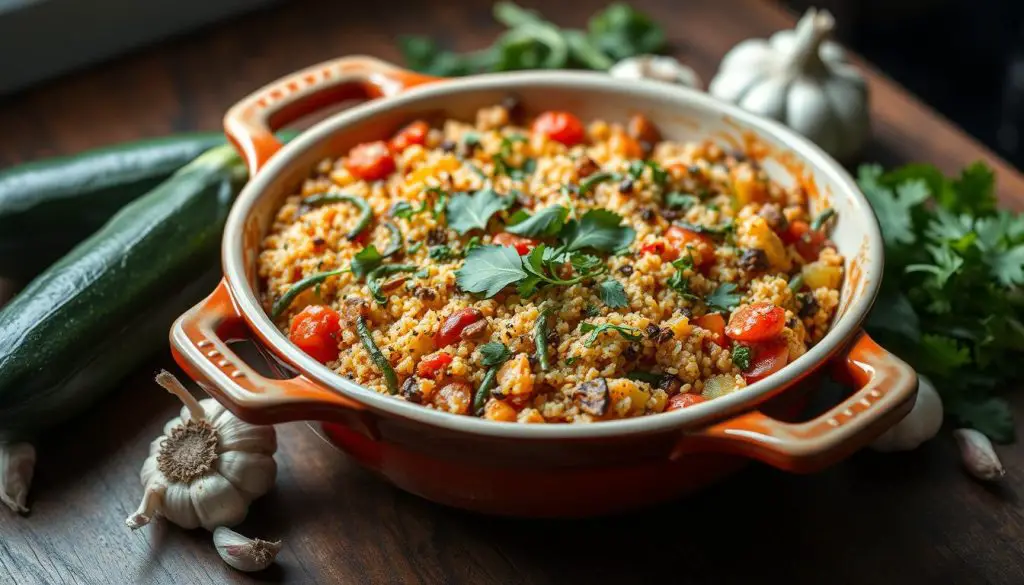
Everyone reacts differently to nightshades. It’s important to listen to your body and find what works for you. Exploring nightshade-free recipes and products can be a rewarding journey towards better anti-inflammatory eating and managing your fibromyalgia symptoms.
Omega-3 Fatty Acids and Fibromyalgia Management
If you’re dealing with fibromyalgia’s chronic pain and fatigue, adding omega-3 fatty acids to your diet might help. Omega-3s, found in fatty fish, flaxseeds, and walnuts, are known for their strong anti-inflammatory effects. They might ease the aches, stiffness, and other symptoms of fibromyalgia.
Studies show that a diet full of omega-3s can greatly benefit those with fibromyalgia. It’s part of a anti-inflammatory nutrition plan. Omega-3s can help fight the inflammation that causes fibromyalgia. This may improve your health and offer natural pain relief.
- Eating anti-inflammatory foods like fruits, vegetables, whole grains, and legumes
- Reducing processed foods, refined carbs, and added sugars
- Drinking plenty of water and getting enough sleep
- Doing gentle, low-impact exercises like yoga or Tai Chi
By taking a holistic approach to your fibromyalgia diet and lifestyle, you can use anti-inflammatory nutrition to find relief. This can improve your life quality.
Vegetarian and Vegan Options for Fibromyalgia Diets
For those with fibromyalgia on a vegetarian or vegan diet, there’s a lot to try. Beans, lentils, tofu, and tempeh are great for muscle repair. Whole grains, fruits, veggies, and healthy fats are packed with anti-inflammatory nutrients.
The eggplant and quinoa bake in this article is perfect for a vegetarian or vegan diet. It lets those with fibromyalgia enjoy many plant-based meals. Legumes like baked beans, chickpeas, and lentils are high in protein, with 12 to 18 grams per cup.
Quinoa and buckwheat berries are also good protein sources, with 8 and 10 grams per cup. Nuts, seeds, and some veggies and fruits add to your protein. This makes it easy to follow a vegetarian fibromyalgia diet or vegan fibromyalgia diet that’s balanced.
Adding more plant-based recipes to your diet can really help. It gives your body the nutrients it needs to fight inflammation and stay healthy.
| Food Item | Protein Content per Serving |
|---|---|
| Baked Beans | 12.2 grams per cup |
| Chickpeas | 11.9 grams per cup |
| Lentils | 17.9 grams per cup |
| Quinoa | 8 grams per cup cooked |
| Buckwheat Berries | 10 grams per cup |
| Almonds | 8 grams per 1/4 cup |
| Hemp Seeds | 10 grams per 1/4 cup |
| Chia Seeds | 8 grams per 1/4 cup |
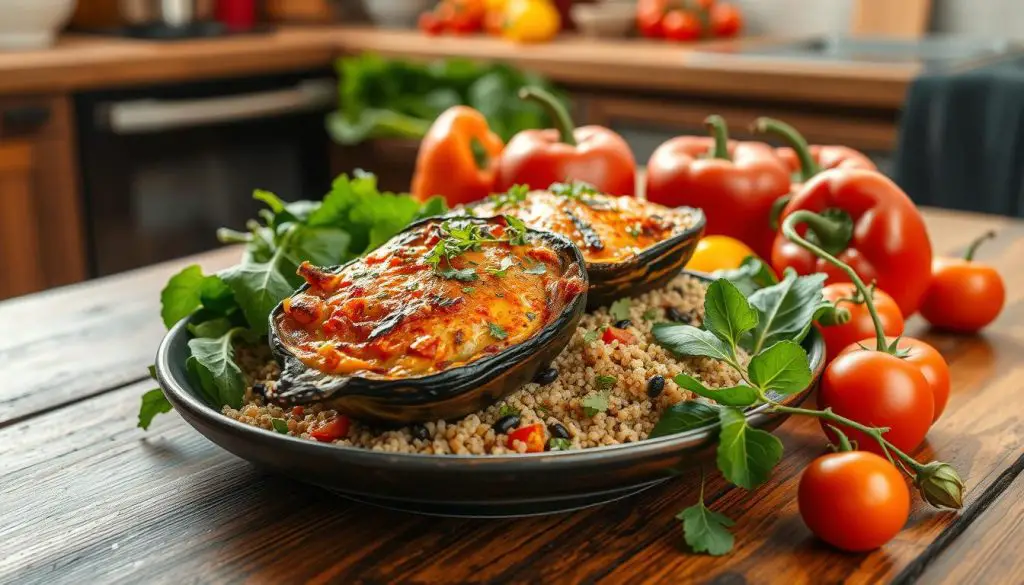
The Benefits of Quinoa for Chronic Conditions
Quinoa, the ancient grain in the eggplant and quinoa bake, is great for those with fibromyalgia and other chronic conditions. It’s a complete protein with all essential amino acids. It also has fiber, complex carbs, and minerals like magnesium and iron.
These nutrients help with energy, muscle function, and overall health. They are key for managing fibromyalgia symptoms.
Nutritional Value of Quinoa
Adding more quinoa-based dishes to your diet boosts essential nutrients. Quinoa is full of:
- Complete protein with all nine essential amino acids
- High in fiber, which can help promote healthy digestion
- Rich in complex carbohydrates for sustained energy
- Good source of magnesium, a mineral for muscle and nerve function
- Contains iron, important for oxygen transport and red blood cell health
By eating more quinoa, a fibromyalgia-friendly food and nutrient-dense ingredient, you support your body’s health. This can help ease symptoms of chronic conditions like fibromyalgia.
Creating a Well-Balanced, Anti-Inflammatory Meal Plan
Making a well-balanced, anti-inflammatory diet is key for those with fibromyalgia. Focus on foods like eggplant and quinoa that help fight inflammation. These foods can improve pain management, energy, and overall life quality.
A good meal plan should include fruits, veggies, whole grains, lean proteins, and healthy fats. This variety is important for reducing inflammation.
With good planning, you can make a diet that meets your needs for managing chronic pain. Try recipes like the eggplant and quinoa bake to help your body fight inflammation. This can ease fibromyalgia symptoms.
Keep in mind, an anti-inflammatory diet is personal. Try different foods and cooking ways to find what works for you. With some effort, you can create a diet that boosts your health and helps manage fibromyalgia symptoms.
Source Links
- https://universityhealthnews.com/daily/pain/fibromyalgia-diet-may-help-control-pain/
- https://www.fischerfamilychiro.com/healthy-recipes.html
- https://www.realfoodforlife.com/purple-eggplant/
- https://www.everydayhealth.com/fibromyalgia/diet/fibromyalgia-what-eat-what-avoid/
- https://www.medicalnewstoday.com/articles/315386
- https://integrativepainscienceinstitute.com/anti-inflammatory-diet-evidence/
- https://www.elephantalwellness.com/post/chronic-pain-natural-remedies-how-an-anti-inflammatory-diet-can-help
- https://www.arthritisfoundationasia.com/anti-inflammatory-diet-arthritis.html
- https://ordinaryvegan.net/bulgur/
- https://www.healthline.com/nutrition/50-super-healthy-foods
- https://ordinaryvegan.net/vegan-roast-wellington/
- https://www.amylongard.com/blog?offset=1492530776725
- https://princessinthetower.org/quick-tips-to-eat-healthily-despite-chronic-pain-tools-to-make-cooking-easier/
- https://www.arthritisfoundationasia.com/arthritis-friendly-recipes.html
- https://thedustybaker.com/2013/03/25/why-are-women-the-gluten-free-gladiators/
- https://www.epbot.com/2019/04/my-favorite-low-fodmap-meals-one-year.html
- https://www.healthline.com/nutrition/foods-vegans-eat
- https://www.nutritiondynamixrd.com/blog/adjusting-recipes-for-a-leap-diet-garbanzo-bean-stew
- https://www.linkedin.com/pulse/basic-nutrition-those-chronic-pain-illness-kira-lynne
- https://medium.com/@khan.elisabeth/i-beat-fibromyalgia-and-ill-tell-you-how-42be8ca83bca
- https://www.confrontingchronicpain.com/your-nutrition-plan-for-chronic-pain/
- https://www.healthline.com/nutrition/dietitian-eating-story-whole-foods-diet
- https://www.ncbi.nlm.nih.gov/pmc/articles/PMC10056340/
- https://danpursermd.com/blogposts/chronicpains
- https://oshihealth.com/low-fodmap-foods-list/
- https://www.healthline.com/nutrition/multiple-sclerosis-foods-to-avoid
- https://www.phoenixhelix.com/nightshade-free-survival-guide/
- https://www.risagrouxnutrition.com/post/good-night-to-nightshades
- https://www.healthline.com/nutrition/plant-paradox-diet
- https://www.fibrofix.com/blogs/news/tagged/fibromyalgia
- https://www.healthline.com/health-news/8-ways-the-mediterranean-diet-can-help-you-live-a-longer-and-healthier-life
- https://ordinaryvegan.net/veganguide/
- https://nourishingmeals.com/2010/01/elimination-and-detoxification-diet-its-about-feeling-good
- https://www.health.com/nutrition/anti-inflammatory-diet
